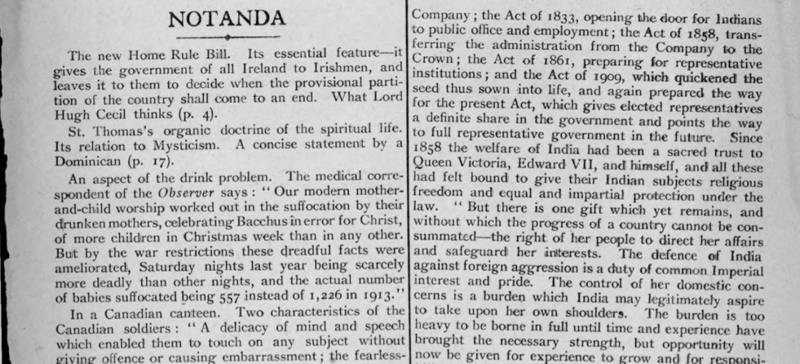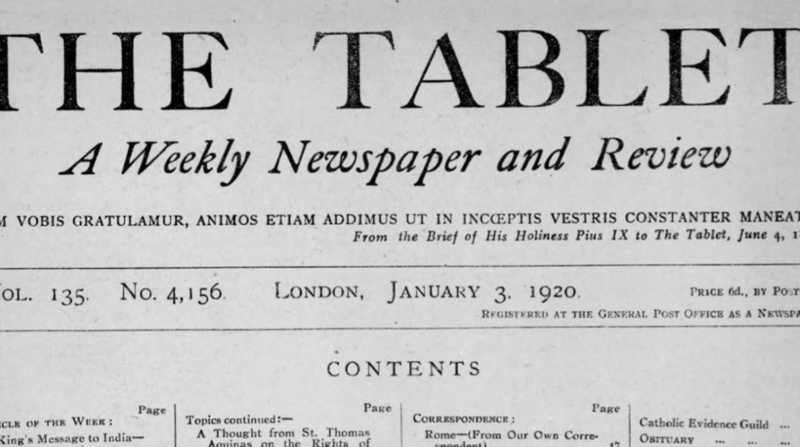Ever wondered what was the The Tablet fare for readers as the Roaring Twenties kicked off? We look back at our archives to 3 January 1920. This edition of the last century contains a large amount of secular and non-Catholic, indeed Anglican, Christian news.
There is a review of Dr WJ Sparrow-Simpson's book on the Letters of St Augustine which covers "grace and predestination, free will and merit, the Unity and Trinity of God, the true character of the Church of Christ" and more.
And there is a scathing assessment of a book by the then Dean of St Paul's, William Ralph Inge: "Mere Jesuit morality did not and does not suffer a man to play fast and loose with the Anglican formularies in that way, come rack, come rope! But Anglicans themselves, ritualist and rationalist, put all mere Romanist casuists in the shade, and, as we have said, the Dean of St. Paul’s says what he means, and means what he says, and battens thereupon. Really, if the issues involved were not so tragic, one might suspect him of an elaborate joke. He considers that 'there is no evidence that the historical Christ ever intended to found a new institutional religion'....When we come to matters definitely religious, we find our author up in arms against Bishop Gore, playing the devil’s advocate to Cardinal Newman, and totally unable to comprehend St. Paul. Indeed, his treatment of Cardinal Newman verges upon the cheap and nasty. His Anglican career is what really matters: pride keeps him from returning: he was only half a Catholic the Roman Catholicism of the future is to be Manning’s, not Newman’s: and so forth. What does the Dean know of Catholicism? To those who have eyes to see it is plain that Newman was a true prophet, and that one by one his visions have been fulfilled."
Funny how much the tone of this resembles today's Twitter...
In addition, there is a somewhat poignant news story from Ireland:
"MAYNOOTH MISSION to CHINA: THIS Irish Mission to China has its College at Dalgan Park, Galway. 300 students have applied for admission to the College, but we have been obliged to refuse them for want of accommodation. With the greatest difficulty and inconvenience we have provided room for 42 students. We are forced to extend our living space very considerably, and we rely on the Catholic people to assist us."
Where will we be with vocations and Maynooth in another 100 years?

An aspect of the drink problem, constantly in the secular headlines of the era, is addressed. The Tablet quotes the medical correspondent of the Observer, who writes: "Our modern mother-and-child worship worked out in the suffocation by their drunken mothers, celebrating Bacchus in error for Christ, of more children in Christmas week than in any other. But by the war restrictions these dreadful facts were ameliorated: Saturday nights last year being scarcely more deadly than other nights, and the actual number of babies suffocated being 557 instead of 1,226 in 1913.”
A further story related to problems caused by excess alcohol consumption also features the story of an orphan born of a Catholic mother:
The Cambridge Medical Mission Settlement in Bermondsey is a Protestant institution engaged in philanthropic work among the waifs and strays of London. One of its subscribers has drawn our attention to a little booklet which tells "the story of one of our Boys." One wet, cold February night a little boy knocked at the door of the Home. It was a sad case. The child was blind in one eye, and deaf in one ear, and dirty and ragged, and stunted in growth. He begged for food and shelter, and told a distressing story of “a drinking father” and a Roman Catholic mother – but she was dead. When the whole tale of misfortune had been told the boy added: "I suppose all this has happened because I am a Protestant." It seems that he had been to a Band of Hope entertainment, and in consequence was called a Protestant by his Catholic relatives. The secretary, Mr. Salmon, was deeply moved as he listened, and not only provided the little outcast with a bed and food, but, late though the hour was, "read and prayed with him—and again at 6.30 in the morning.” Then a happy change came over the child ; “seldom have I met a boy to whom the Gospel message was so sweet." Fed upon the pure milk of Protestantism, the boy soon grew strong, and in due course found a place in an office. Then a strange thing happened; he was employed by four large companies in succession; in each case he so pleased his employers that lie was offered promotion, but there was every time something in the new position not quite right, and he had to refuse the promotion, as it involved work he felt it would be wrong for him, as a Christian, to do, and he got dismissed in consequence.
If those four successive employers – and they were large companies – really supposed that they could induce this Protestant young man to sand the sugar or to water the beer, they gravely underrated the moral influence of Mr. Salmon and the Medical Mission Settlement of Bermondsey. Those were dark days, and we are told that though the young man’s misfortunes were “a great trial to his faith, yet they had a very steadying influence on his Christian character.” In January, 1919, however, all his troubles were over. In that month, he started in business for himself, and has done so remarkably well that to-day he has a large staff of clerks. He is just this month forming his business into a limited liability company. We confess that we should like to have a glimpse of the prospectus of that company. However, there the facts are. The young man who began business only last January is already a successful company promoter and commands “ a large staff of clerks.” In the circumstances it is not surprising to learn that he is “engaged to one of our very best girls from the girls’ club.”
I wonder if this story rings any bells with any Tablet readers – it would be so amazing to find out what became of this boy, and his descendants, a century later.
Subscribe here to the digital and print edition of The Tablet, with full access to the archive.



 Loading ...
Loading ...